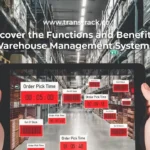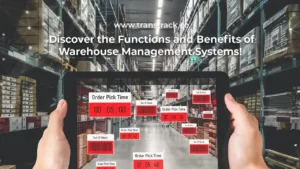Dwelling Time and Its Impact on Logistics Activities
Posted on January 23, 2024 by Nur Wachda Mihmidati

Dwelling time is a term that is closely related to the logistics process. High or low dwelling time can affect logistics activities ranging from operational costs to customer satisfaction.
So, what is dwell time, and why is it so important in determining operational efficiency? In this article, we will answer these questions and discuss the factors that affect dwell time, its effect on the logistics process, and how to optimize it. Let’s improve your knowledge about dwelling time with TransTRACK!
What is Dwelling Time?
Dwelling time, also known as dwell time, is a very relevant term in the world of logistics. Dwelling time encompasses the period of time during which a vehicle, container, or load remains in a certain place, such as a port or warehouse, before continuing its journey or further processing. Basically, dwell time reflects the duration of a logistics entity’s stay at a location.
This dwell time is an important parameter in measuring the efficiency of supply chains and logistics processes. The shorter the dwell time, the smoother the logistics flow of a company. In a broader sense, dwell time is not just a number, but reflects how a company is able to manage and optimize the time it has to minimize the possibility of backlogs, high operational costs, and improve overall efficiency. Therefore, an in-depth understanding of dwell time is key in improving logistics performance and company competitiveness.
Factors Affecting Dwelling Time
Various factors can affect dwelling time, and an in-depth understanding of these is important to improve the efficiency of logistics operations. Some of these factors include:
Slow Loading and Unloading Process
Slow loading and unloading processes are one of the main causes of high dwelling times. When vehicles arrive at a location, such as a port or warehouse, the time it takes to move goods from the vehicle to the storage area or vice versa can directly affect dwelling time. Limited transport equipment or inadequate loading and unloading equipment can cause costly delays.
Complicated Licensing and Administration
The inability to take care of licensing or administration quickly can be a serious hindrance to a smooth logistics process. Administrative processes such as document inspection, customs clearance, and validation of shipping documents require significant time and in-depth understanding. Delays and difficulties in these administrative stages can directly extend dwelling time.
Inadequate Facility Conditions
Inadequate facilities can be another factor affecting dwell time. Slow moving equipment or limited storage capacity can cause a buildup of goods and slow down the process flow. Investments in infrastructure and technology updates can help overcome physical constraints that can slow down the logistics process.
Unscheduled Transportation
Uncertainty in transportation schedules can also be a cause of high dwell time. External factors such as road traffic, bad weather, or uncertainties in vehicle movements can cause unexpected delays. Careful management of schedules, perhaps by utilizing technology for real-time monitoring, can help reduce these uncertainties.
The Effect of Dwelling Time on the Logistics Process
Dwelling time has a significant impact on a company’s logistics process. In this context, dwelling time is not just a technical term, but a key determinant of efficiency and service quality in the supply chain.
High dwelling time directly impacts a company’s operational costs. Wasted time due to vehicles or cargo experiencing delays at ports or warehouses can increase labor, fuel, and vehicle maintenance costs. Therefore, companies are likely to face greater financial pressure due to uncontrolled dwell time.
Besides cost, inventory management is also affected by dwell time. Long lead times can cause delays in providing products to customers, reduce customer satisfaction levels, and may even result in the loss of customers. Disrupted product availability can also lead to increased stock levels and wastage of resources.
Logistics efficiency also depends on the extent to which companies can manage dwell time. Long dwelling times can create bottlenecks in the supply chain, impeding the flow of goods and information. As a result, companies can experience difficulties in optimizing the use of resources and time, leading to unsatisfactory logistics performance.
Dwelling time plays a crucial role in determining the health and efficiency of a supply chain. By understanding what dwelling time is, the factors that influence it, and its effect on the logistics process, companies can design more effective strategies in time and resource management.
It is important to remember that every company has its own unique needs, therefore, the right approach in managing dwell time may vary. However, the implementation of a system such as TransTRACK’s Truck Appointment System can be a very effective first step in achieving better dwelling time management.
The system allows companies to plan vehicle arrival schedules, avoid backlogs, and improve loading and unloading efficiency. Truck Appointment System can help companies schedule logistics activities in a more organized manner, reduce waiting time, and ensure smooth operations.
By continuously improving understanding and adopting innovations in logistics management, companies can reduce dwell time, improve efficiency, and respond more quickly to market dynamics. In the ever-evolving world of logistics, the ability to manage dwelling time well is not just an advantage, but a necessity to remain competitive and sustainable. If you want to understand more or get customized solutions to improve logistics efficiency and manage dwelling time, visit the TransTRACK website for more information.
Recent Post
Topic :
 Bahasa Indonesia
Bahasa Indonesia









